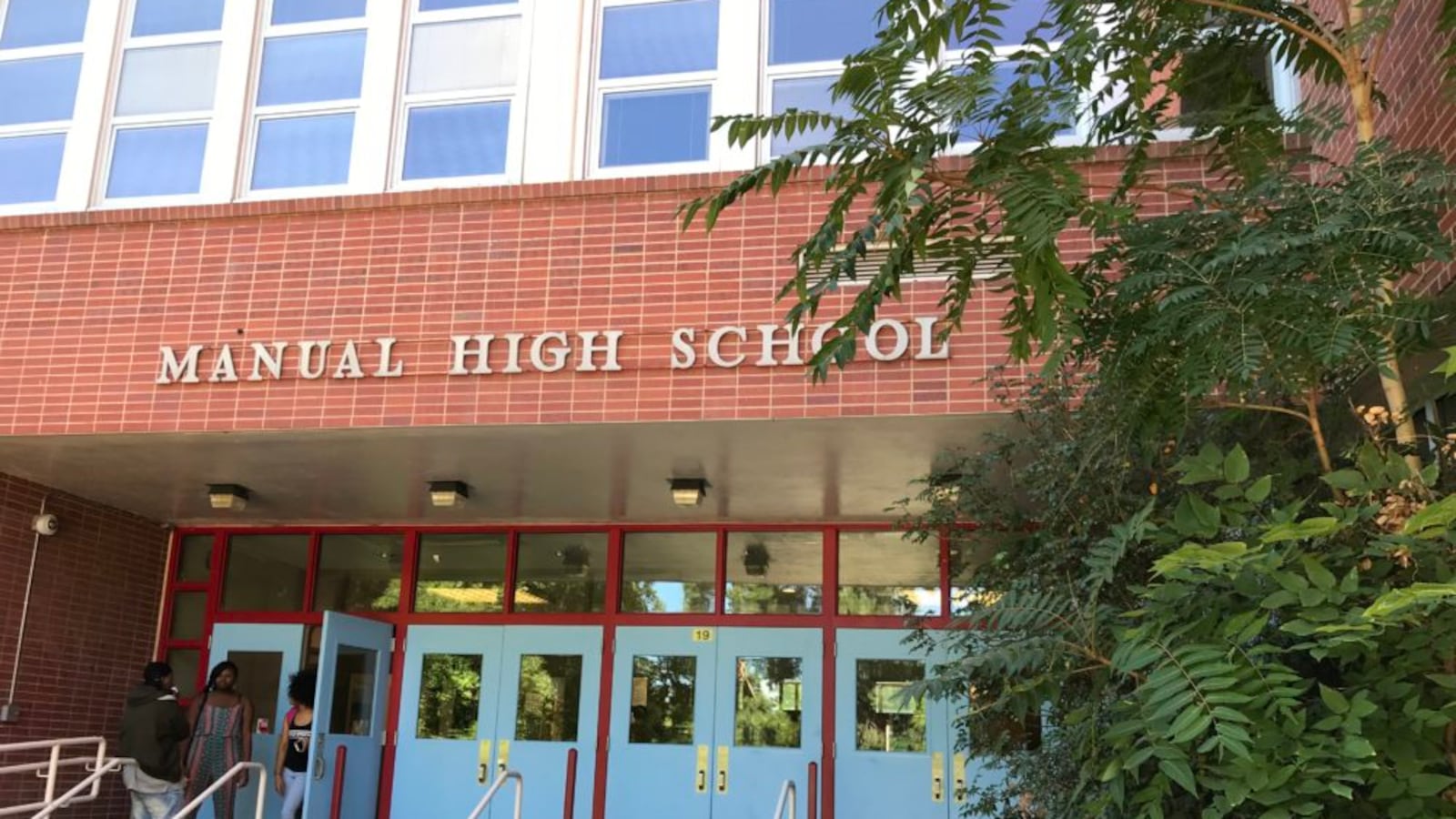For the first time ever, two Denver schools faced state action Thursday after years of low performance. But rather than close the schools or convert them to charters, the State Board of Education largely endorsed the Denver district’s own improvement plans.
The state board unanimously directed Abraham Lincoln and Manual high schools to follow “innovation plans” that give the schools more flexibility in hiring, budgeting, and curriculum, and encouraged them to continue working with a school leadership program.
The action represents the first time the state board has intervened this way in Denver Public Schools, a district with a history of taking aggressive action to improve low-performing schools. Innovation is the least drastic and most frequent intervention taken by the state board.
“Very few schools can use that as the silver bullet,” board member Joyce Rankin, a Carbondale Republican, said to the Lincoln principal. “You’re telling me you can, but boy, I wish you all the success with that.”
Lincoln, in southwest Denver, and Manual, in the northeast, both had at least five consecutive years of low student test scores and low school ratings, which triggered state action.
But there’s a catch: Denver Public Schools is the only district in Colorado that uses its own school rating system instead of the state system. Denver’s system is rigorous, and when the district rates a school lower than the state, it asks the state to lower its rating to match.
That happened to both Lincoln and Manual in the past five years — a point state officials made clear to state board members, some of whom lauded Denver for its high standards.
“Lincoln is in front of you today because of the district’s expectations,” said Deputy Education Commissioner Alyssa Pearson. If Denver hadn’t asked the state to lower Lincoln’s ratings, she said, Lincoln “wouldn’t be here today.” The same goes for Manual.
However, Denver Public Schools officials said they agree Lincoln and Manual need to improve. Last spring, Lincoln students earned an average score of 415 on the reading and writing part of the SAT, while Manual students earned a 434. The statewide average was 505.
“This process, it’s unfortunate we’re here, but it has given us the push to create plans that will dramatically accelerate improvements so we’re not back,” Superintendent Susana Cordova said in an interview after the board voted to approve Lincoln and Manual’s plans.
Manual, established in 1892, has a rich history and tumultuous recent past. The district closed Manual for low performance in 2006, and since the school reopened in 2007, it has gone through seven principals, each with their own unique vision for the school.
The inconsistency contributed to low test scores, Cordova said. Although principals have had grand plans, they’ve struggled with putting them into action. “Our greatest challenge has been maintaining a focus on the day-to-day work,” she said.
Today, Manual serves about 300 students. It’s an “early college,” which means students can take college courses while in high school. The school also has a biomedical pathway program called The Med School at Manual that allows students to work at local hospitals and earn industry certificates in fields such as nursing, phlebotomy, and dentistry.
It also has a relatively new principal, Joe Glover, who’s committed to staying for several years.
“Manual deserves to be restored to its greatness,” he told the board.
Lincoln has more than 900 students, about two-thirds of whom are learning English as a second language. Inconsistent leadership, low expectations, and lack of proper support for second language learners led to Lincoln’s lagging achievement, district leaders said.
Cordova is a graduate of Lincoln, as is the new principal, Antonio Esquibel. This is his second stint leading Lincoln. Last time, Esquibel raised student test scores and enrollment. He told the state board he’d “returned home” to help Lincoln improve once again.
His vision is to create three paths for students: one focused on Advanced Placement and college-level courses, another focused on career and technical education and apprenticeships, and a third option, called P-TECH, that would allow students to stay at Lincoln for a fifth or sixth year to earn an associate degree or an industry certificate in a technical field.
“Our team is very strong, and we are focused,” Esquibel said.
Both schools are working with a University of Virginia school leadership program that has had success with other struggling schools in Denver and surrounding districts. The schools will also get support from the district itself, including additional funding, help recruiting and retaining teachers, and a staff member whose job is to “remove district barriers” for the schools.
“The last thing a principal of a struggling school needs to do is struggle with bureaucracy,” Cordova said.
Most state board members seemed confident in the plans for Lincoln and Manual, though they asked questions about what the district would do to keep leaders in place long-term and what those leaders would do to raise student attendance and achievement.
Rankin was the only member to express serious pause. In the case of Manual, where test scores have lagged for six years, she asked the district to give the University of Virginia “more of a foothold in your school.” She didn’t define what that would mean, other than to say she wasn’t asking that the University of Virginia take control. District leaders quickly agreed.
“I think there needs to be a little more outside help,” Rankin said.

